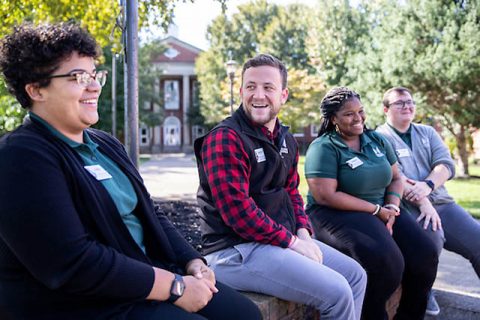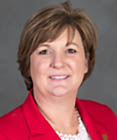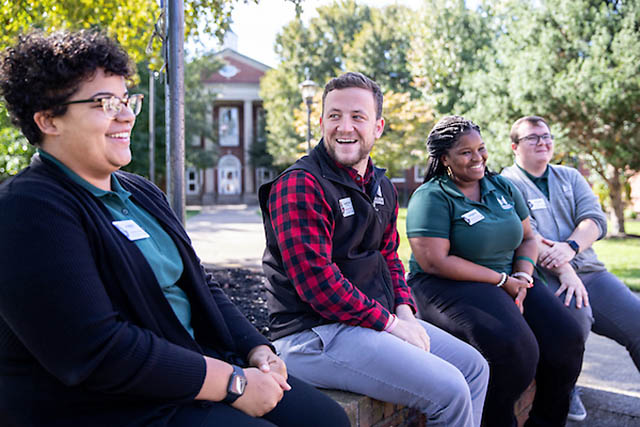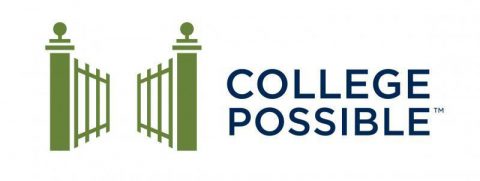 Clarksville, TN – Hampton Freeman, a student success coach embedded at Austin Peay State University (ASPU), said it takes about 10 minutes for students to relax and trust him.
Clarksville, TN – Hampton Freeman, a student success coach embedded at Austin Peay State University (ASPU), said it takes about 10 minutes for students to relax and trust him.
“When they come in, they’ll put their bookbag down very neatly and make sure they’re sitting up straight,” he said. “Then later, I’ll notice them scooting back, crossing their legs, and you can just see from their posture, they’re comfortable.”

That comfort likely comes from the fact that Freeman, a May 2019 APSU graduate, is only three or four years older than the students he helps. Four months after earning his undergraduate degree, he returned to campus to guide Pell-eligible and first-generation college students through rough patches in their academic careers.
Freeman and three other student success coaches are now living on campus, advising 480 freshmen on everything from how to register for classes to how to relax after a stressful exam.
“I tell my students I’m a mentor; I don’t want you to look at me as an adviser because that’s not my job,” DeNesha Bell, a success coach, said. “I’m more of a mentor, guiding you, giving you advice on college and how to get through it since I recently graduated. You’re not talking to someone who’s 10-plus years removed telling you how to navigate things.”
The four coaches are AmeriCorps volunteers, and they arrived on campus this year thanks to a new partnership between Austin Peay State University and College Possible, a national nonprofit that connects high school and college students with success coaches close to their age. The nonprofit calls these coaches “near-peer mentors.”
‘We look for some history of innovation’
In 2016, College Possible launched Catalyze, an initiative to improve student success and retention through near-peer coaching. According to the nonprofit, only 12 percent of college students from low-income backgrounds earn a degree, compared to 58 percent of students from high-income backgrounds. Between 2017 and 2018, College Possible noticed an increase in retention rates at schools with near-peer mentors. During the last academic year, 92 percent of the program’s fall participants returned for the spring semester.
This successful model attracted the attention of Dr. Loretta Griffy, APSU associate vice president for student success, because in 2018, 48 percent of Austin Peay State University students were eligible for Pell grants and 29 percent were first-generation college students. Last year, Griffy invited College Possible representatives to campus to see if the University would be a good fit for the Catalyze program.
The two organizations developed a partnership, and over the summer, Griffy and Schmidt identified three recent APSU graduates and one recent University of Cincinnati graduate to serve as Austin Peay’s first near-peer success coaches. The four individuals joined AmeriCorps, the federal government’s voluntary civil service program, and they were sent to College Possible’s Minnesota offices for a week of intense training.
“It was seven hours a day for a week,” Aubrey Lewis, College Possible success coach, said. “We talked about student perspectives and how a student might feel, and we talked about culture and how to be inclusive. We talked about crises during that week, and how to take care of ourselves and how to be a great coach.”
Embedding coaches on APSU Campus

For the program to work, the College Possible coaches need to be active members of the Austin Peay State University community. Griffy wanted the four near-peer mentors to become familiar faces on campus so she found them office space in the McReynolds Building and, working with Student Affairs, she secured them on-campus housing at APSU’s Emerald Hills apartments.
“We want them on campus, interacting with students,” she said. “I think if we don’t have our coaches embedded on campus, both in professional offices and residing on campus, they won’t be visible. We want them to work-out here, go to athletics events, lectures, behave as if they’re part of campus.”
“They want us to be as close to the students as possible,” Edward Greer, College Possible success coach, said. “We are frequently out and about, talking to students or working with advisers within the colleges we work with.”
When students meet with their coaches, they get advice and encouragement from someone who was recently in their same situation.
“I give an example of my freshman year, when everything was great,” Bell said. “My sophomore year, my GPA dropped tremendously. Had I given up, I wouldn’t be sitting here. I just want them to know I’m in their corner. You have another person to vent to or lean on or advocate for you.”




